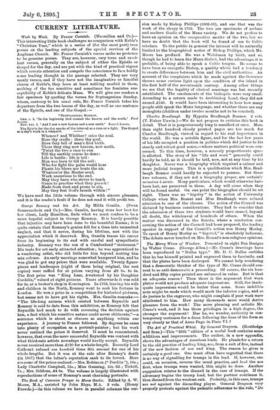CURRENT LITERATURE.
Week by Week. By Fraser Cornish. (Macmillan and Co.)— This interesting little book challenges no comparison with Keble's "Christian Year," which is a series of (for the most part) true poems on the leading subjects of the special services of the Anglican Church. Mr. Fraser Cornish's verses make no pretence to be genuine poems. They are, however, very terse and excel- lent verses, generally on the subject of either the Epistle or (loapel for the day, and are put with the kind of practical vigour which arrests attention and compels the conscience to face boldly some leading thought in the passage selected. They are very manly verses, and if they have not the imaginative or fanciful charm of Keble's, they have at least nothing morbid in them, nothing of the too sensitive and sometimes too feminine sus- ceptibility of Keble's delicate Muse. We will give our readers a fair specimen by quoting the verses for Septuagesima Sunday, where, contrary to his usual rule, Mr. Fraser Cornish takes his departure from the two lessons of the day, as well as one sentence of the Epistle, and one of the Gospel : — " SEPTUAGESUIL SUNDAY.
GEN. I. 1. 'In the beginning God created the heaven and the earth.' First .Lesson.
Ray. is:. 1. ' And I saw a new heaven and a new earth.' Second Lesson.
The Epistle for the day speaks of the interval as a race or a fight. The Gospel as a day's work in a vineyard.
Whence? and Whither? cries the soul. Here thy cradle : there thy goal. Here they tell of man's first birth. There they sing new heaven, new earth. 'Twixt the two a race to run Till thy earthly course be done : Life is battle : life is toil : Man was born to till the soil : Who for fight the palm would bear Plants his blows nor beats the air. Whatsoe'er the Master send, Work unenvious to the end.
May they have who strive to teach Grace to practise what they preach ! Made from dust and prone to sin, May they feel God's breath within !"
We have read the little volume through with sincere pleasure, and it is the reader's fault if he does not read it with profit too.








































 Previous page
Previous page